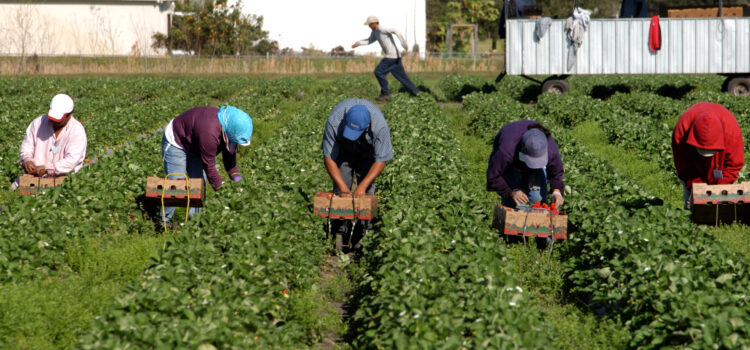
A new bill that would give legal status to thousands of undocumented farm workers passed in the House of Representatives Dec. 11 and moved to the Senate.
The bipartisan Farm Workforce Modernization Act of 2019, which has support from more than 300 agriculture groups and labor organizations, passed with a vote of 260-165. Advocates of the bill say it creates a workforce solution for the agriculture industry in the U.S. by providing “stability, predictability, and fairness” to one of the most critical sectors of America’s economy.
“Today’s House vote for bipartisan legislation letting undocumented farm workers and their immediate family members earn legal status is the result of the tenacious leadership farm workers showed after traveling across the country to lobby on Capitol Hill,” said UFW Foundation Executive Director Diana Tellefson Torres. “Legislators have voted in favor of protecting the people whose hands harvest the fruits and vegetables offered in congressional buildings’ cafeterias and all of American’s kitchen tables.”
Torres continued: “Whether it is through organizing in congressional districts or walking the halls of Congress, farm workers are a force that deserves recognition during the nine months it took to craft and get the legislation through the House.”
The bill would establish a program for agricultural workers and their families in the U.S. to earn legal status through continued agricultural employment and “contribution to the U.S. agricultural economy”; would adjust the H-2A program to provide more flexibility for employers, while ensuring critical protections for workers; and would establish a mandatory, nationwide E-Verify system for all agricultural employment, according to a fact sheet of the bill.
This is the first time in decades the full House, under either party, has enacted an agricultural labor immigration bill, according to a news release by the UFW Foundation.
“The men and women who work America’s farms feed the nation. But, farm workers across the country are living and working with uncertainty and fear, contributing to the destabilization of farms across the nation,” said Rep. Zoe Lofgren, who sponsored the bill. “Our bill offers stability for American farms by providing a path to legal status for farm workers.”
In order to be considered eligible under the Act, applicants must prove they’ve worked in the U.S. agricultural sector for at least 180 days throughout the past two years. They then would be able to request five-year visas for themselves, their spouses and their minor children. Individuals can renew their five-year visas by working at least 100 days in agriculture each year.
Individuals would also have the option to apply for legal permanent resident status if they meet one of two criteria. Individuals who have worked in agriculture in the U.S. for at least 10 years before enactment must work an additional four years in agriculture after enactment before they can apply. Or individuals who have worked in agriculture in the U.S. for less than 10 years must work an additional eight years in agriculture before being eligible to apply for legal permanent resident status.
“The Farm Workforce Modernization Act addresses the nation’s future labor needs by modernizing an outdated system for temporary workers, while ensuring fair wages and workplace conditions,” Lofgren said.
The Act would also reform the H-2A program. One of the changes includes wage reform, which would “better reflect real-world wages, while protecting against sudden wage increases that disrupt employer planning and operations,” according to the fact sheet. For example, from 2021 to 2029, wages could not decrease by more than 1.5 percent or increase by more than 3.25 percent.
Other adjustments to the program include availability of farm worker housing while lowering employer costs related to providing such housing and addressing the year-round labor need with an increased access to green cards and temporary three-year visa.
The majority of farmworkers in the U.S. are in California, according to the Visalia Times Delta, where more than 420,000 farmworkers work to feed the nation. Of these workers, U.C. Davis estimates that up to 60 percent of California’s farmworkers are undocumented, The Times Delta reports.
“Getting people from both sides of the aisle, farmers, ranchers, and labor on the same page is no easy feat,” said Rep. TJ Cox. “So I am especially proud to support this legislation which will bring U.S. residents out of the shadows, protect their rights, and stabilize the farming economy for future generations.”